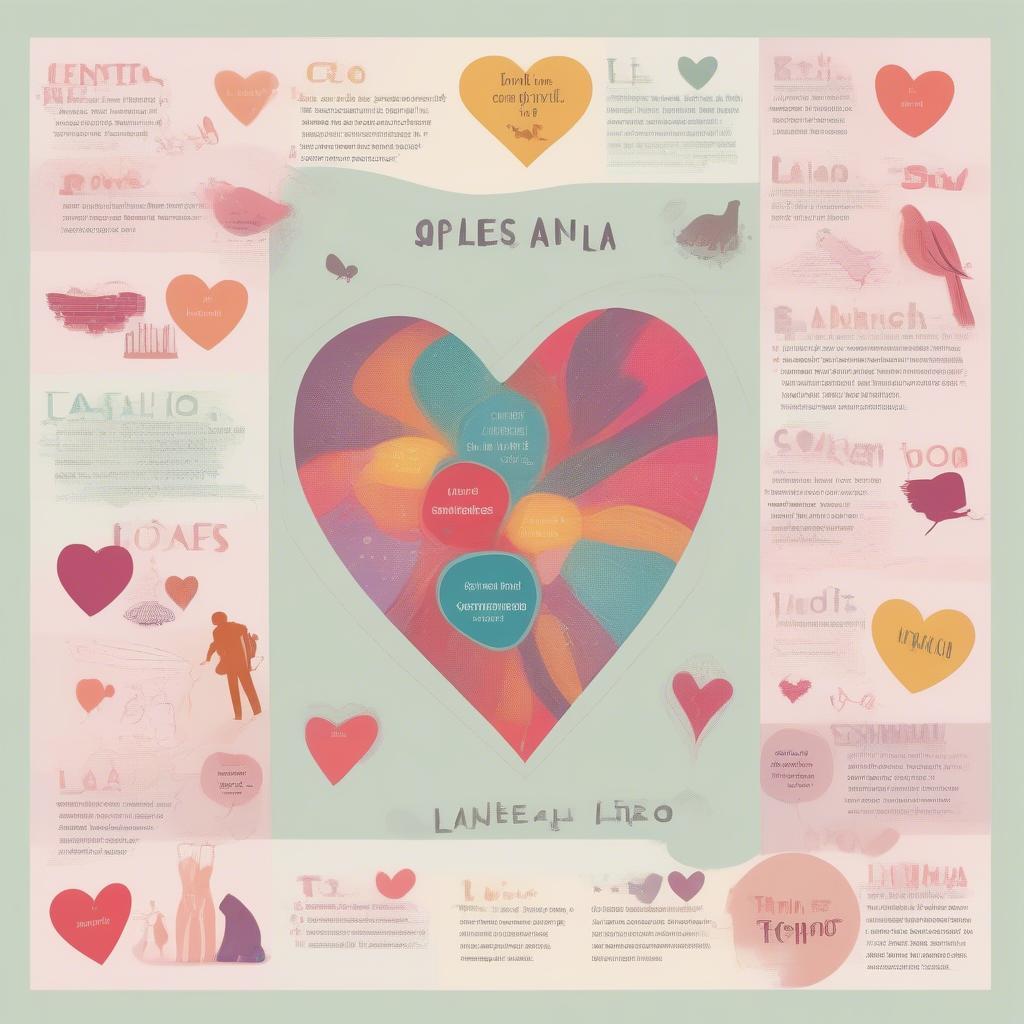Expressing deep affection is a universal human experience, but the words we use carry unique cultural nuances. If you’re looking for passionate ways to say “I love you a lot” in Spanish, you’ve come to the right place. This article will explore various phrases, from the simple and sweet to the intensely romantic, helping you choose the perfect words to convey your feelings.
Beyond “Te Amo”: Expressing Profound Love in Spanish
While “te amo” is the most common way to say “I love you” in Spanish, there are many other phrases to express deeper levels of affection. Choosing the right phrase depends on the context and the intensity of your feelings. Let’s dive into some beautiful and expressive options that go beyond the standard “te amo.”
Saying “I Love You A Lot” in Spanish: Different Nuances
Here are some ways to express “I love you a lot” in Spanish, ranging from affectionate to deeply passionate:
- Te amo mucho: This is the most straightforward way to say “I love you a lot.” “Mucho” simply means “a lot” or “very much,” intensifying the feeling of “te amo.”
- Te quiero mucho: While “te quiero” can be translated as “I love you,” it’s generally considered less intense than “te amo.” Adding “mucho” elevates the expression, making it suitable for expressing strong affection.
- Te amo con todo mi corazón: This translates to “I love you with all my heart,” a beautiful and heartfelt way to express profound love.
- Te amo con toda mi alma: Meaning “I love you with all my soul,” this phrase adds a touch of poetic intensity.
 Expressing Love in Spanish
Expressing Love in Spanish
Romantic and Passionate Expressions of Love
For those wanting to express even stronger emotions, these phrases add a layer of passion and romance:
- Estoy locamente enamorado/a de ti: Meaning “I’m madly in love with you,” this phrase clearly conveys the intensity of your feelings. Remember to use “enamorado” if you’re male and “enamorada” if you’re female.
- Me tienes loco/a de amor: This translates to “You drive me crazy with love,” a playful yet passionate expression. Again, use the correct gender ending depending on whether you are male or female.
- Eres el amor de mi vida: This beautiful phrase means “You are the love of my life,” signifying a deep and enduring love.
Affectionate Nicknames and Terms of Endearment
Using terms of endearment can further personalize your expression of love. Here are a few examples:
- Mi amor: My love
- Cariño: Darling or sweetheart
- Mi cielo: My heaven
- Mi vida: My life
 Romantic Spanish Phrases
Romantic Spanish Phrases
Choosing the Right Phrase for Your Situation
The best way to say “I love you a lot” in Spanish depends on your relationship and the level of intimacy you share. For newer relationships, “te amo mucho” or “te quiero mucho” might be appropriate. As the relationship deepens, you can use more passionate phrases.
“Choosing the right words is crucial. While ‘te amo’ is beautiful, sometimes you need a more profound expression to truly convey the depth of your feelings,” says Dr. Isabella Rodriguez, a renowned relationship expert specializing in cross-cultural communication.
How Do You Say I Love You a Lot in Spanish: A Quick Guide
To summarize, here’s a table for quick reference:
| Phrase | Meaning | Intensity |
|---|---|---|
| Te amo mucho | I love you very much | Moderate to High |
| Te quiero mucho | I love you very much | Moderate |
| Te amo con todo mi corazón | I love you with all my heart | High |
| Te amo con toda mi alma | I love you with all my soul | High |
| Estoy locamente enamorado/a de ti | I’m madly in love with you | Very High |
| Me tienes loco/a de amor | You drive me crazy with love | Very High |
| Eres el amor de mi vida | You are the love of my life | Very High |
 Saying I Love You in Different Ways
Saying I Love You in Different Ways
Conclusion
Expressing love in another language adds a special touch to your relationship. Whether you choose a simple “te amo mucho” or a more passionate declaration, the sincerity of your feelings will shine through. So, go ahead and express your love in beautiful, romantic Spanish!
FAQ
-
What’s the difference between “te amo” and “te quiero”? While both translate to “I love you,” “te amo” generally expresses a deeper, more romantic love, while “te quiero” can also be used for familial love or close friendships.
-
Is it appropriate to use passionate phrases early in a relationship? While it depends on the individuals and the cultural context, it’s generally best to build up to the more intense expressions as the relationship develops.
-
Are there regional variations in these phrases? While these phrases are generally understood throughout the Spanish-speaking world, some regional variations and dialects might exist.
-
What are some other ways to express affection in Spanish? Aside from saying “I love you,” you can express affection through compliments, gestures, and actions.
-
What if I mispronounce a phrase? Don’t worry! Most people appreciate the effort you’re making to communicate in their language.
-
How can I learn more Spanish love phrases? There are numerous resources online, including language learning apps and websites, that can help you expand your vocabulary.
-
Is it important to understand the cultural context of these phrases? Yes, understanding the cultural context can help you choose the most appropriate phrase for the situation and avoid any misunderstandings.
For further assistance, feel free to contact us at Email: contact@daiduongtranhba.com or visit our office located at Michigan Ave, Suite 3100, Chicago, IL 60611, USA. Our 24/7 customer support team is always ready to help. We also have a wealth of articles on building healthy relationships, expressing your feelings, and navigating the complexities of love on our website. Check out our related articles on romantic gestures and communicating effectively with your partner.

